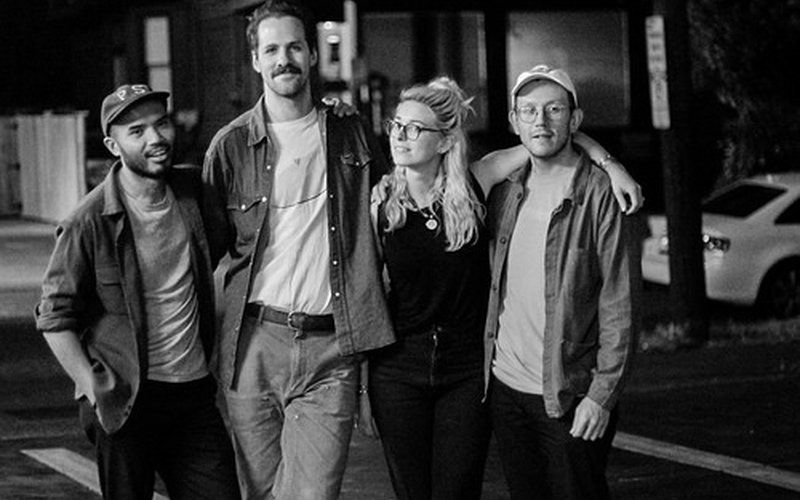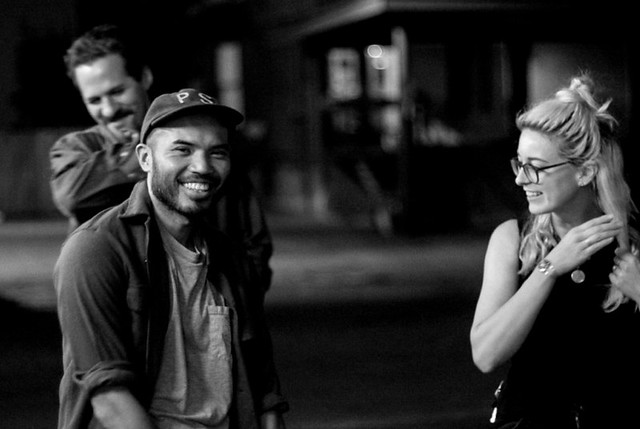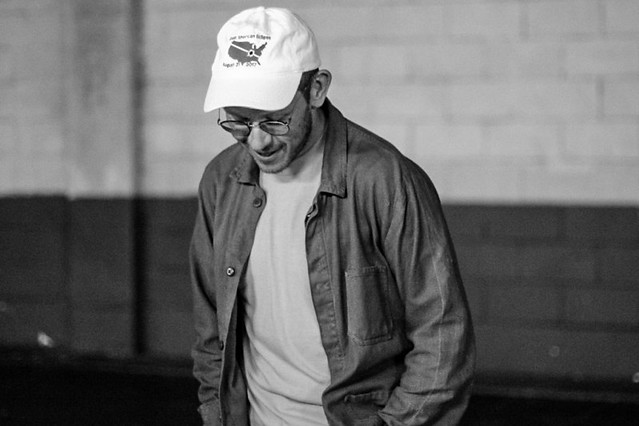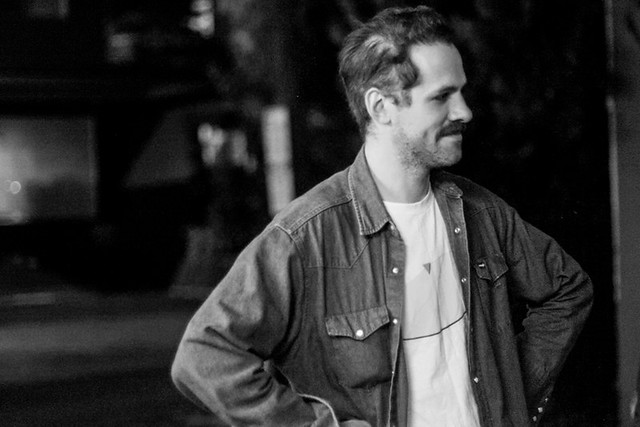
When Darto's Nick Merz was 21 years old, he found himself crossing a bridge. Not a metaphorical bridge, but a literal one. As he walked with his friend, the man gave him some sobering criticism.
"In all your music, you only ask why," the man said. "You're not saying anything. You're just asking why."
"That stuck with me," Merz says. "I still think about that... It's like, 'Yeah, are you just gonna sit and ask 'why?' like everyone else and be like 'why is this happening?' Or are you actually going to just say something?"
In the past, Darto has been associated with death. In an interview with Seattle Weekly in 2014, the band opened up about their harrowing origins. About how the band formed after the tragic death of Merz and Candace Harter's friend and bandmate Jared Sletager. About how a boiler room explosion killed a man in Kentucky as he was pressing one of Darto's records. It'd be easy and understandable for the band to sink into questions of "Why?", but when I sat down with the band at Nacho Barracho in Capitol Hill on a humid August night, we didn't talk about "why" or try to dig up old ghosts this time. Because who Darto is today isn't a band dwelling on darkness — they're a band that's about hope. That's what defines their latest LP, Human Giving, out now on Aago Records.
Before digging into the album and the stories swirling around it, there are a few things to understand about Darto. First of all, they're not a band that keeps their members in defined roles. While Merz and Harter started the band and have kept a rotating lineup since its inception in 2010, they don't consider themselves to be "leaders". There's no one voice that defines who Darto is. While bandmates Gordon De Los Santos and Greg Flores are relatively new additions to the band, they carry just as much weight in the band's artistic direction. As did Willa Goettling, who was primarily drumming in the band until she moved to Chicago partway through the recording on Human Giving.

"It's weird to think about being in a band now that is super prescriptive in terms of what people are supposed to be playing," Flores says. "Especially with how people can play other things. Maybe your drum part is gonna be way better than my idea so why should I sit here and force myself to be the drummer?"
The structure of the band mirrors much of what happens on Human Giving. Just as the players aren't confined to a certain instrument, the album isn't concerned with filling any genre obligations and the songs follow whatever whim feels natural. From the record's opening moments, the cleansing synthesizer wash of "GDLS", it's clear that the band has parted ways with the brutal, noisy aesthetics of their 2014 LP hex. Wait — or have they? Asking the band about the sonic shift, they don't necessarily see much of a shift at all.
"I personally don't feel like any of our stuff was ever aggressive," Merz says. "Not to say that your take is wrong or anything, but it's that I don't really hear a difference. I just hear a difference volume wise with the old stuff. The songwriting's kind of the same. It's the same intention behind it... It's easy to equate something as being heavily based off of volume or aggression or anything like that."
This is an important distinction to make and one the whole band wholly accepts. Flores adds that even before he joined Darto, he never thought about them as "being constrained to loud music" and saw them as being open to any sort of sound they wanted as long as it lined up with the trajectory they wanted to go in.
"One of our friends said this one time — 'Volume isn't power,'" Merz recalls. " That made a pretty big impact on us."

That mindset is felt throughout the record. The first song released from the record, "I Am," was the first hint at the band "turning down the volume," but more importantly captures a massive philosophical idea. Cellos, synthesizers, sparse drums, and the distant guitar strums and lead lines are all that's needed to hold up their mantra. "I am the means to an end/A place for change to begin again," Harter and Merz sing, barely raising their voices. The musical arrangement of the track is impeccable, but it's the weighty ideas that they're grappling with that is, rightfully, the true star of the moment. In a song that's about becoming part of something bigger than yourself, you don't need a larger than life arrangement. For this record, the band was far more concerned with creating something that would leave affect listeners with emotional positivity rather than beastly riffs.
"We just share the idea of basically trying to shift things and make an impact on people," Harter says. "It's less of trying to force ideas on people, that's not what I'm saying. I'm just saying, just being this band but also these particular types of good humans. Just create positivity and being able to reflect that back onto people. If they resonate with that, great; if they don't, whatever. But just to try and be that reflection of positivity and positive change."
Flores jumps in to add to Harter's comments, saying, "Every individual is constantly fighting against this idea of self. Any of the bullshit that people encounter is because of their ego. Like Candace was saying, you're making the decision to move past that impulse to just only look out for yourself."
Merz says that he hardly remembers writing most of the songs that eventually made their way onto Human Giving, but he can distinctly remember sitting in a car with Harter talking about their vision for their next project.
"I remember this one really specific conversation before we even wrote anything, both her and I were like, 'Don't want this to be mysterious. Don't want this to be coming from the dark. Don't want this to feel spooky or weird or ominous or anything. We want it to be completely hopeful,'" Merz recalls.
It's not something that totally comes naturally to the band. Flores says that each member of the band has a tendency toward creating art that is "moody" and "dark," opting this time around to venture off into a different direction.
"The band starting from dark places and trying to rise above that, but also there's not gonna be a point where you really are able to fully divorce from where you came from," Flores explains. "But you try. And I feel like that's what makes a lot of the record and a lot of the lyrics that [the band] wrote interesting is that it feels like this intentional, 'Yeah, there's a lot of shit about being human and it's really hard sometimes and there's a lot of shit in the world, but the first step out of that is to just try. And try to see the better things and try to speak to the good things rather than just kicking around in the muck.'"

Positivity and removing the idea of "self" go hand-in-hand on the record. On the song "No Self," Harter repeats in French, "Pas de soi/Pas de fenêtre/Se reconnaître," which roughly translates to, "No self/No window/To recognize." The song itself tumbles in a tick-tock rhythm, becoming a whirlpool of enlightened ideas swirling together. The tense bass line rumbles as vocals pan across the left and right channels. It's disorienting at first, maybe even overwhelming. But the English lyrics push out a complementing thought, "Turning to repeating innate beliefs and underestimating the weight of each piece." The repetition of this phrase over and over again helps to reveal its meaning, culminating in a sort of chorus bellowing, "Peace comes somewhere." Amidst this madness, against the vastness of the world around us, there's peace in losing yourself. It's a manifesto against ego and an embodiment of the constant internal battle of identity.
"Going through adolescence and all these things, it's really easy to point the finger and say, 'Oh, the world's doing me wrong,'" Merz says. "And then at some point, you start to realize how small you are in the grand scheme of things. I mean, we all realize that, it's just kind of like those lyrics and those ideas reminding, 'Hey, [you're] pretty small. It's not about you. It's not about any of us at all."
Listening to Human Giving feels less like putting on a record and more like an act of meditation. Sure, they showcase some impressive musical chops (that guitar solo on "Guiding Light" is so righteous), but it all feels incidental compared to the larger truth the band is seeking out. The layers of music are there to get lost in, and maybe through that process, the listeners can learn to lose themselves.
There's something about the booming sound of an analog synthesizer that excites the imagination. Decades of filmmakers and composers have utilized the mesmerizing power of these instruments, from John Carpenter to Vangelis all the way through Hanz Zimmer and Cliff Martinez. So it made sense that Se…
For generations of music fans, the invention of the music video was a landmark moment. Being able to associate your favorite songs with equally exciting visuals was such an obvious combination, it's a wonder it didn't break through earlier. Whether it's gluing your eyes to old-school MTV or getting…
Each Halloween we indulge ourselves in our worst fears. Maybe it's ghouls and demons or gore and violence. One of the most disturbing settings for horror has less to do with the paranormal – insane asylums. It's a combination of the fright of our own minds can conjure up as well as the fear of bein…
Throwaway Style is a weekly column dedicated to examining all aspects of the Northwest music scene. Whether it’s a new artist making waves, headlines affecting local talent, or reflecting on some of the music that’s been a foundation in our region; this space celebrates everything happening in the …
From a patio overlooking the foothills of the Cascade Mountains near Leavenworth, WA, Seattle musician, Josh Rawlings, prepares himself for a month-long writing session with famed Seattle music producer, Ryan Lewis. Rawlings, who has toured with the golden-voiced Allen Stone and is one-fourth of th…
Every week, KEXP features a new local artist with an interview and suggested tracks for where to start. This week we're highlighting Seattle songwriter and producer RVN, who recently self-released his LP GREYNEON.